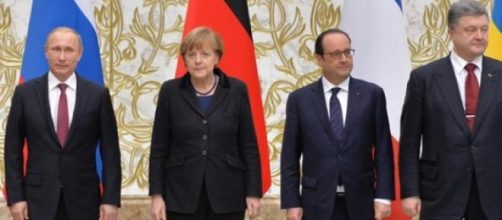The Russian president Vladimir Putin announced, this morning, that a ceasefire deal for the Ukrainian crisis was reached and will go into effect on the 15th of February. The announcement came after 17 hours of tense negotiations, in Belarus, between the Russian, Ukrainian, French and German leaders.
The ceasefire agreement includes the withdrawal of heavy weapons and foreign armed groups from the conflict areas, disarmament of all illegal militias, lifting the restrictions and decentralising more power to Ukraine's 'rebel areas' and the release of prisoners from both sides.
The deal was also signed by the pro-Russian rebels in Eastern Ukraine. Alexander Zakharchenko, the leader of the Donetsk rebels, warned that if Ukrainian president Petro Poroshenko violates any of these new agreements the ceasefire will be immediately called off. The leader of the Luhansk rebels, Igor Plotnitsky, said they were ready to "give Ukraine a chance to change its constitution and its attitude".
The French president François Hollande told reporters that the deal managed to reach an important agreement on contentious issues like border control, decentralisation and economic sanctions but recognised that there is "very, very much work still to do". A similar cease-fire deal had been agreed in September 2014 but unravelled quickly with accusations of treaty violations from both sides.
The German chancellor, Angela Merkel said that this is "a glimmer of hope" to all those affected by the conflict. More than 5,400 people have already lost their lives since April and the bloodshed keeps on rising, with over 200 people being killed just in the first two months of 2015.
Several key contentious issues are still unresolved and will require further negotiations: The status of Debaltseve, a town held by Ukrainian government troops but surrounded by rebels; how far the decentralisation of powers to 'rebel areas' should go; or how will Ukraine be able to monitor border areas with Russia, controlled by the rebels.

